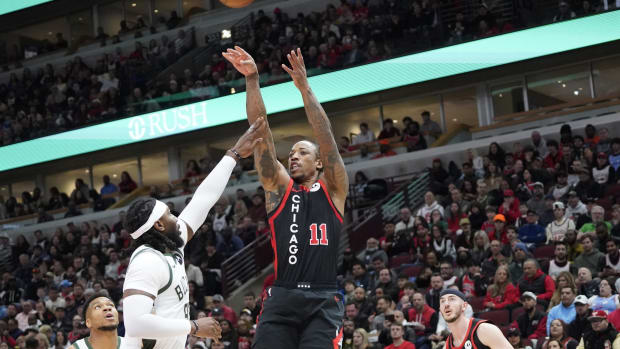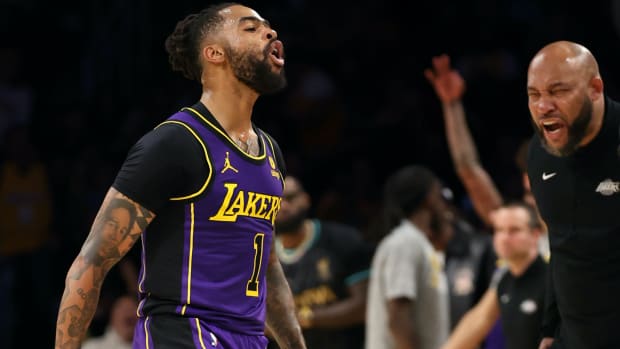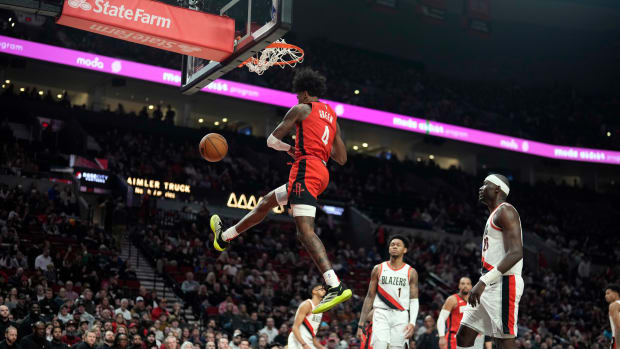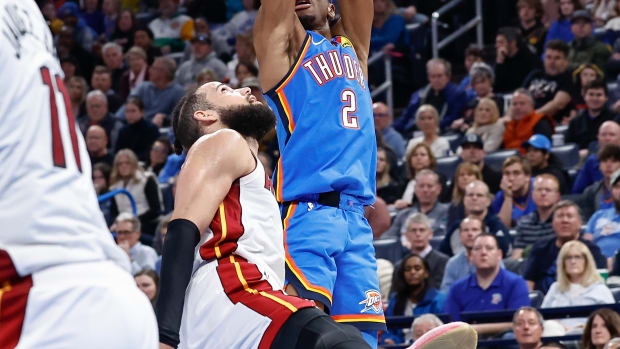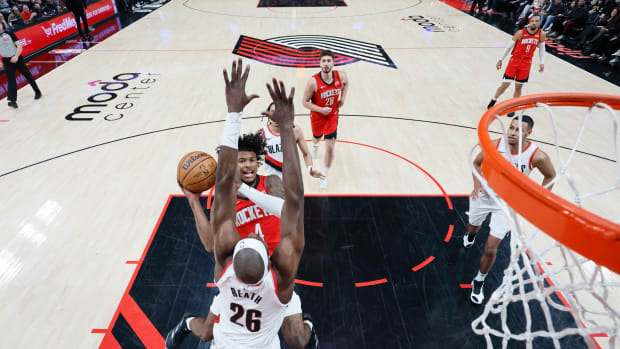Trying to Process the Shock and Horror of Kevin Durant's Achilles Injury
Kevin Durant had played brilliantly to start the NBA playoffs, with amazing averages and effort that buoyed the Golden State effort. The Warriors played well without him until they reached the Finals and ran into a determined Raptors team, finding themselves trailing 3-1. The Warriors finally welcomed Durant and all was well for a little over a quarter. Then one of the best players in the world went down with an Achilles injury.
While Golden State won Game 5 106-105 and moved the series to 3-2, they suffered a terrible loss and will play without one of the biggest stars in basketball. The Open Floor podcast discusses Durant's gutting injury, the events that led up to that faithful moment and more.
(Listen to the latest Open Floor podcast here. The following transcript has been edited and condensed for clarity.)
Ben Golliver: That was one of the most gutting events period that I've seen happen unfold before my eyes. I feel awful for Kevin Durant. I thought Bob Myers' postgame speech about it hit a lot of the right notes, but it still left me feeling a little bit off and weird. The entire building reacted initially in very strange fashion, as some of the Warriors were quick to point out. I thought the Raptors pulled things together and had a very nice, classy and dignified response to things, but I mean this was a basketball tragedy. We're talking about a top 10 or top 15 all-time player with a career-altering injury after sacrificing basically his own health to rush back on the court after facing significant criticism over the last week or so. It's just a bummer, man. And it was a great game. I'm sure we're gonna get to the game in a second. But to me it was just gutting.
Andrew Sharp: We could get to the game, but I don't even want to talk about the game. We're gonna have to talk about it at some point. It's an NBA podcast, sure. And I think that people watching at home probably felt the same way, but watching it in the stadium I didn't even really enjoy the game that much.
Golliver: No, it was horrible. It was excruciating. I mean we make things like root canal Reggie and stuff like that, but that was like deeply painful on a spiritual level. For anyone who loves basketball—doesn't matter what team you're on, what fan base you cheer for—you never want to see it go like that.
Sharp: Yeah, and I think there's a rush to assign blame in the wake of all this.
Golliver: Do you feel like blame needs to be assigned? To be honest, I'm a little bit in shock.
Sharp: I'm a little bit in shock. That would be the first place to start. And Steve Kerr even came out in his press conference and said, "Talking to the guys, I didn't know what to say." I think that's the only proper reaction right now because A) we don't know enough about what was going on behind the scenes and what kind of pressure there was or wasn't to have Kevin Durant play. The one thing I would say is that Kevin Durant is an adult and he is represented by adults. He probably has a set of doctors that he met with separately.
Golliver: And keep it real. He's dancing around before the game. He is swishing jumpers during warm-ups. He wanted to be out there. And I've said that consistently for the last couple of months. There is no question ever did I think he was in a situation where he was playing games that he didn't want to be back on the court. If we know anything about him he's a basketball addict. Now you can have all sorts of questions about how did they message this?
Sharp: That would be my point. My point is if he were seriously injured or more seriously injured than the warriors ever let on, I wish they had messaged that better and made that clear and talked in detail about the extent of the injury.
Golliver: They couldn't have done a worse, right? I mean it was basically as bad as it can get, and I don't know if they were playing the game of like let's just shroud it in secrecy and maybe we're gonna throw off the Raptors and make them overthink things. Talk about like shooting yourself in the foot. Because clearly Durant he's hearing all this stuff. He always hears it. There's all these questions that the teammates are apparently starting to get frustrated. All those reports come out after Game 4. Steve Kerr's giving us one story after Game 3 and changes his story after Game 4. It was just an out-and-out mess from a franchise that usually does PR very, very well.
Sharp: And to be clear, what we're saying is that if you message it more clearly in terms of his timetable and the pain his dealing with and the risks, I think that would have eliminated a lot of room for people to pressure him and question his toughness and speculate about whether he's sitting out and why and that just didn't happen. And instead we did have that sort of world of speculation where I don't blame people for asking questions because I think even people on the Warriors were asking questions. I think even Warriors players were reading reports about when he was supposed to come back and then seeing that he didn't come back, and then that kind of made things more complicated behind the scenes. And we don't know how much that played into Durant coming back.
But one thing I would say though is I think it strips him of some agency to act as if he was just bullied into coming back on the court. This was a huge spot and Kevin Durant is a competitor, and I think that's one of the main reasons he wanted to be out there.
Golliver: He certainly knew the risks. There's no question about it. That's why I'm not necessarily interested in rushing to the blame game. This is one of those teachable moments for all the basketball coaches and want to be baseball coaches and parents and kids that are out there. This is like real trauma and look how various people responded. You have Steph Curry rushing to his teammates aid accompanying him to the locker room, you've got Andre Iguodala offering his shoulder to Kevin Durant, got Bob Meyers finally after a month of silence coming out and just being like, "You know what, I'm going to lay it all on the table. This was gutting, go ahead and blame me. I accept responsibility if you need to blame somebody, put it on my shoulders." That's a lot of good character. Also, Kyle Lowry and the other guys on the Raptors team were impressive getting the crowd to sort of understand the gravity of the moment, to take a step back.
Sharp: That's the thing, I think that people were killing Raptors fans to some degree. And I think the most plausible explanation is that most of the people cheering Kevin Durant going down didn't necessarily understand exactly what was happening.
Golliver: And the ball was going the other way, too. So you have this moment where you're breaking free in the open court and it's like, "All right, we're gonna score," and so your excitement is up. And now he's down on the ground, what does this mean? And I do think there was a little hint of bloodthirstiness.
Sharp: Yeah, let's not beat around the bush actually because I think there were people on the Toronto side who I saw saying, "They were just confused, they were cheering because it was a turnover." They were very clearly cheering because Durant was hurt for about the first 30 seconds, and then they realized what a horrible look that was and saw their players kind of lead them in the opposite direction, which was pretty encouraging. Whether it was Serge Ibaka or even Nick Nurse I think reached out to Durant as he was walking off. That part was really cool, but we don't need to completely let them off the hook.
Golliver: I understand that. I'm not going to let him off the hook, but I'm more understanding though of the Raptors' situation. I mean the fans are all amped up, this is a moment they've been waiting for years if not decades. Some of these people are sleeping outdoors before the game; any little advantage your mind is immediately going to think to your own self-interest, which is why I think we should focus on the bigger picture positive takeaways here, which is great sportsmanship from Toronto, great collective team identity. I mean, how often have people tried to put a wedge between Steph and KD, right? And I think there's some real distance between those two guys, but when things really hit the fan Steph was there for him. I promise you a guy like Kevin is not going to forget that. After the game he wrote on Instagram, "I'm hurting deep in the soul right now. I can't lie. But seeing my brothers get this win was like taking a shot of tequila. I got new life." If that's not like the most raw, honest thing we've heard Kevin say in the last three years, I don't know what would be.
Sharp: Klay was very emotional in his press conference as well, and basically sort of paying his respects to Durant and what he's meant over the last couple years. I think it's true that a lot of things have been complicated behind the scenes, but when it mattered those guys are riding together. And I don't know if I don't know whether people can hear it in my voice, this just sucks. So we can talk about who to blame, Raptors fans—the core issue is that we watched Kevin Durant warm up for 45 minutes before tip off tonight and just watching him move around I was reminded how much I like watching him play basketball. Seeing him back out there you're like, "God, he is just awesome." And then he starts off the game and plays really well for the first quarter and a half that he's out there, and then to have that all kind of ripped away for 12 months... we don't know how serious the Achilles injury is but it's a really serious injury.
Golliver: Achilles are usually serious. There are not a lot of minor Achilles injuries out there. I think to kind of go along with what you're saying though, when you're seeing him out there in the flesh it's just a reminder that not only is he a player who we haven't seen play for a month, but he's a human being and he's not just a search-engine topic or a narrative device or all these other things that he winds up becoming because he's that big of a superstar.
And you're right to start to wonder, what does it look like going forward? I mean if it's a 12-month injury, if it's a serious Achilles injury, he's a free agent coming up this summer. I don't think it would impact his earning power. I think he'd still have the four-year max offers from basically any of these teams that he's interested in other than Golden State. But it does absolutely represent sort of a touch point for his career, right? An inflection point. Anytime guys have a Achilles injuries, it's pre Achilles and it's post Achilles. And he's such a great shooter. He's so hard to defend. He's so long, he moves so well. He's a good ball handler. He has a lot of elements to his game that are gonna help him overcome or keep playing at a high level after an Achilles injury. But he's not exempt from that changing or altering the course of his career. And it's horrible to say that in the moment after it happened, but there is a reason why Bob Myers is in tears.































